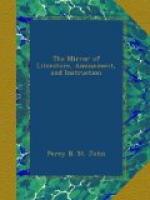PAWNBROKING.
Is carried on to a very great extent in China. The system seems divided into two parts; one branch affording aid to those in the very inferior walks of life, and chiefly confined to very small advances; the other granting loans upon deposits of higher value, and corresponding with similar establishments in England. These are authorized by the government; but there are others, we are informed, that exist without this sanction, and are directed to the relief of the mercantile interest. These assimilate very nearly to the late project in London of an Equitable Loan Company, making advances upon cargoes and large deposits of goods.
These houses are as conspicuously indicated, by an exterior sign over the door, as our shops in England are by the three golden balls; but, whether they indicate the same doctrine of chance as to the return of property, we will not pretend to say. Three years are allowed to redeem, with a grace of three months.
TORTURE.
In China, the laws still permit torture, to a defined extent, and the magistrate often inflicts it, contrary to law. Compressing the ancles of men between wooden levers, and the fingers of women with a small apparatus, on the same principle, is the most usual form. But there are many other devices suggested and practised, contrary to law; and in every part of the empire, for some years past, there have been many instances of suspected persons, or those falsely accused, being tortured till death ensued. From Hoopih province, an appeal is now before the emperor, against a magistrate who tortured a man to death, to extort a confession of homicide; and we have just heard, from Kwang-se province, that on the 24th of the 11th moon, one Netseyuen, belonging to Canton, having received an appointment for his high literary attainments, to the magistracy of a Heen district, in a fit of drunkenness, subjected a young man, on his bridal day, to the torture, because he would not resign the band of music which he had engaged to accompany, according to law and usage, his intended wife to his father’s house. The young man’s name was Kwanfa. He died under the torture, and the affrighted magistrate went and hanged himself.
CHINESE PRISON.
Prisoners who have money to spend, can be accommodated with private apartments, cards, servants, and every luxury. The prisoners’ chains and fetters are removed from their bodies, and suspended against the wall, till the hour of going the rounds occurs; after that ceremony is over, the fetters are again placed where they hurt nobody. But those who have not money to bribe the keepers, are in a woful condition. Not only is every alleviation of their sufferings removed, but actual infliction of punishment is added, to extort money to buy “burnt-offerings” (of paper) to the god of the jail, as the phrase is. For this purpose the prisoners are tied up, or rather hung up, and flogged. At night, they are fettered down to a board, neck, wrists, and ancles, amidst ordure and filth, whilst the rats, unmolested, are permitted to gnaw their limbs! This place of torment is proverbially called, in ordinary speech, “Te-yuk,” a term equivalent to the worst sense of the word “hell.”




